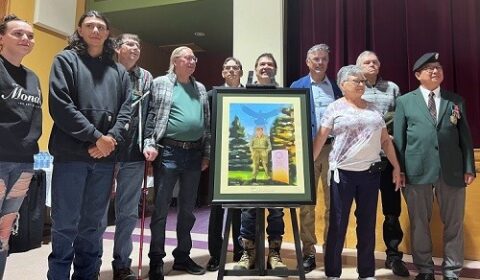‘HONOURING HERMAN STOCK’: A TRIBUTE THAT HONOURS SPIRIT, VALOUR, LEGACY’ OF D-DAY WAHTA ‘WAR HERO’
Greg Hammond, Special to MuskokaTODAY.com
WAHTA — This morning MAC artist Greg Hammond presented his piece “Honouring Herman Stock” to Chief Phillip Franks of Wahta First Nation.
“Honouring Herman Stock” is a tribute that captures the spirit, valour and legacy of a young man from the Wahta First Nation, who was killed 80 years ago on D-Day, when he landed on Juno Beach during the liberation of France.
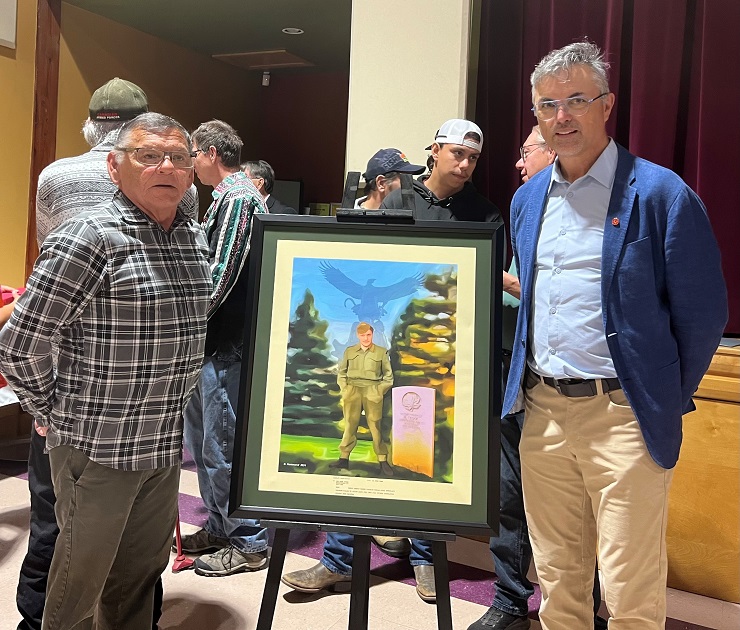
In an emotional presentation at Wahta’s municipal office this morning — attended by members of the Wahta community, including a number of Stock’s relatives, a representative of the Queen’s Own Rifles of Canada (his former regiment) and members of the public — Hammond discussed the veteran’s service, the D Day landing June 6, 1944 and the impact his death had on his family and community.
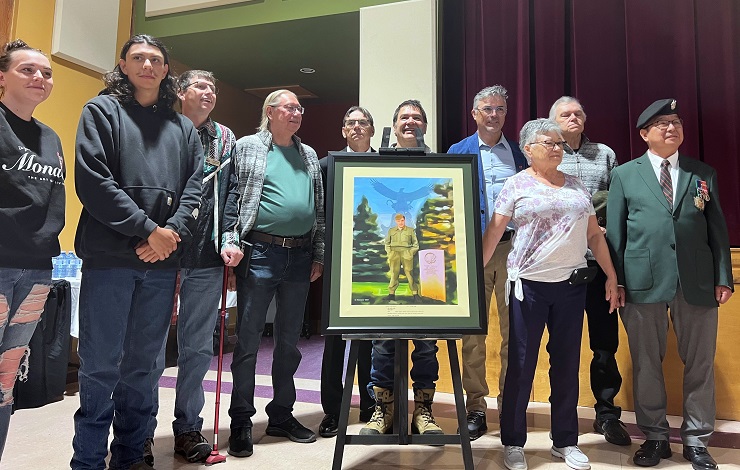
At a time when there were only about 100 residents of Wahta, more than two dozen men and women from the First Nation served in the Canadian military during the Second World War.
Stock’s brother, Harry, served overseas and their father, Robert, served in the First World War — and again in the Home Guard in the Second World War.
Hammond described their national service after he had visited Beny-Sur-Mer Canadian Military Cemetery in Normandy eight years ago.
He said he became “connected” to Stock through books and videos that mentioned war hero. “And I felt compelled to do this piece in his memory.”
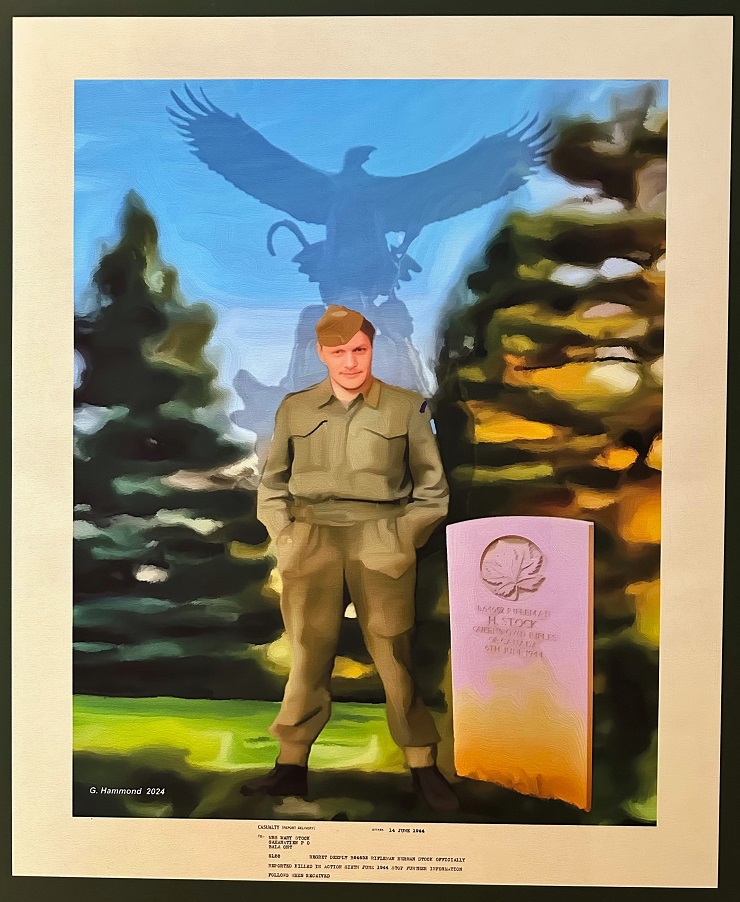
The memorial comprises of seven mains elements, each filled with symbolism and meaning:
- The central figure is Stock, a powerful young man full of life, dreams, and hopes. His carefree demeanour contrasts with his battle dress uniform, capturing the essence of his youth and the gravity of his service, highlighting the personal sacrifices made by all those who serve.
- Stock’s gravestone serves as a stark contrast between his youthful image and his gravestone underscores the profound loss felt by his passing.
- The Maple Leaf signifies his Canadian identity, and the date June 6, 1944, marks D-Day, a pivotal moment in the Liberation of Europe and the war.
- The Beny-Sur-Mer Canadian War Cemetery, though beautiful, is far from Wahta First Nation. Representing the forests of his homeland, this element symbolizes bringing Herman back to his roots. By placing Herman in a familiar forest setting, the memorial connects him to his ancestral heritage and the land he loved.
- Silhouetted in the background, The National Aboriginal Veterans Monument reflects traditional Indigenous values of honour, duty, and harmony with the environment.
- The Thunderbird atop the sculpture represents the Creator and embodies the spirit of Canada’s Aboriginal peoples. This connection honours Herman Stock while recognizing the broader contributions and sacrifices of all First Nations veterans.
- The Telegram to Mary Stock highlights the personal and communal loss experienced by his family and community. The telegram announcing his death as a poignant reminder that his sacrifice was shared by his loved ones. And symbolizes the collective grief and the impact of his loss on the Wahta First Nation and beyond.
“Together, these elements create a memorial that honours Herman Stock’s memory, celebrates his heritage, and acknowledges the broader sacrifices made by Indigenous veterans and their communities.”
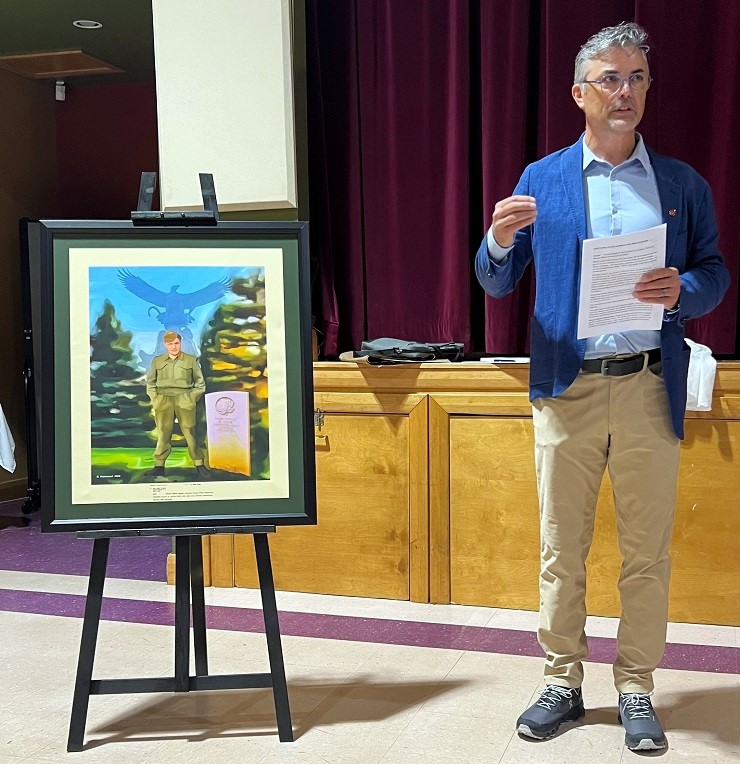
EMAIL: news@muskokatoday.com
30 years of TRUSTED ‘Local Online Journalism’
SINCE MAY 20, 1994
Twitter: @muskokatoday, Facebook: mclairmont1
SUBSCRIBE for $30 by e-transferring to news@muskokatoday.com
Mail cheque to MuskokaTODAY.com Box 34 Gravenhurst, Ont. P1P 1T5
And include your email address to get stories sent to your inbox
